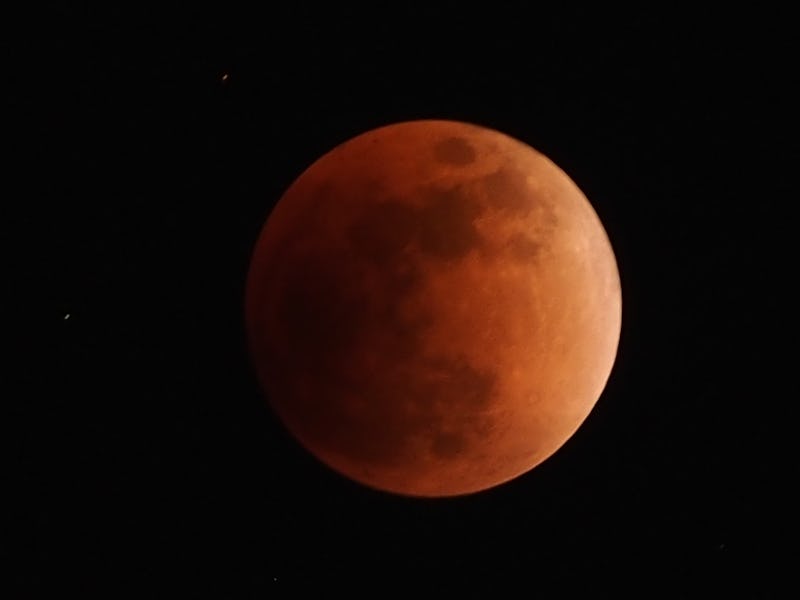The Super Blue Blood Moon Really Freaked Out Doctors and Nurses
“Blue moon, blood moon, eclipse — it just spells trouble."

The word ‘lunatic’, with its roots in the Latin luna, for moon, used to describe people who seemed to become temporarily insane as the moon went through its different phases. Now largely used by world leaders to insult one another, its definition has become much broader, but on occasions like Wednesday, when the much-anticipated Super Blue Blood Moon reared its head in the early morning, the term’s spooky mythology seems as relevant as ever. The effect is especially pronounced in hospitals.
“We pride ourselves on being scientific people,” said Dr. Patricia Valcke, a palliative care physician at St. Paul’s Hospital in Saskatoon, Saskatchewan, in an interview with Inverse, “But the more celestial events that line up, the weirder things get.”
Wednesday’s Super Blue Blood Moon, described as an “astronomical trifecta,” was a full moon that wasn’t only huge and terrifyingly red but also a lunar eclipse and the second full moon of January.
Things are strange enough during full moons, says Valcke, noting that “people hold on for a long time then half the unit passes in one night.” But events like a Super Blue Blood Moon are even eerier. “Blue moon, blood moon, eclipse — it just spells trouble,” she says, noting that nursing homes “go wonky” and elderly patients start having “odd” behaviors for “no particular reason.”
Anecdotal evidence suggests hospitals get busier during lunar events, but the scientific literature shows no link.
Nancy Brisebois, a self-described “fossil” of a nurse who works with Valcke, tells Inverse that in her 40-plus years of experience, she and her peers have learned to “get their runners on” during a full moon because everyone knows it’ll be a busy night. “We try not to be on call on a full moon,” she says. “Something weird always seems to happen.”
Anecdotes like these are simply that — anecdotes — but it’s impossible to deny the sheer number of healthcare professionals that have stories to share. One study investigating the link, published in Advances in Mind-Body Medicine in 2017, cites a figure saying 81 percent of mental health workers report anecdotal evidence of a link between human illness and full moons. Naturally, these stories, told and retold in ICUs and emergency rooms in hospitals across the continent, have led many researchers to try to get to the bottom of it. The results of these investigations consistently turn up null, however, making it all the more maddening that everyone seems to see a correlation.
In early January, for example, physicians from Wayne State University School of Medicine published an article in Critical Care Medicine entitled “Do moon phases or proximity influence the incidence of delirium and agitation in ICU patients?” Explaining what led to the study, Aeman Hana, a co-author and medical student, tells Inverse that “the claim is not widespread but it is common and mentioned by some of the healthcare workers.”
Like many related studies in the literature, the paper starts out with a description of the phenomenon that’s puzzled humans for centuries: “The potential influence of lunar phases, most notably full moons (FM), on a wide range of human physiology, especially of a psychological nature, has been the subject of much debate.” In this particular study, the researchers searched for correlations between the behavior of 5,795 patients and phases of the moon over two years in one hospital. As with the Advances in Mind-Body Medicine paper, which used similar methods to assess 1,857 patients, the study didn’t turn out any links.
Despite the anecdotes, the evidence that the moon has any sort of effect on human behavior is, as a 2016 Frontiers in Pediatrics article put it, “weak.” That study, which looked at 33,710 sleep cycle recordings from kids from 12 different countries to see whether the moon had any effect on sleep duration — concluded that sleep duration is 1 percent shorter during a full moon compared to a new moon, but even the authors questioned whether the findings were clinically meaningful.
It may be that physicians and nurses, for all the careful objectivity inherent in their work, are as susceptible to confirmation bias as the rest of us. Or perhaps there really is a link between human physiology and the moon that still eludes us. Whatever the case, during lunar events, healthcare professionals can’t help thinking that they probably should have just taken some time off.
“We knew, ‘There’s this monstrosity on January 31’, and no one wants to be on call,” said Brisebois. “The full moon causes things we can’t explain.”